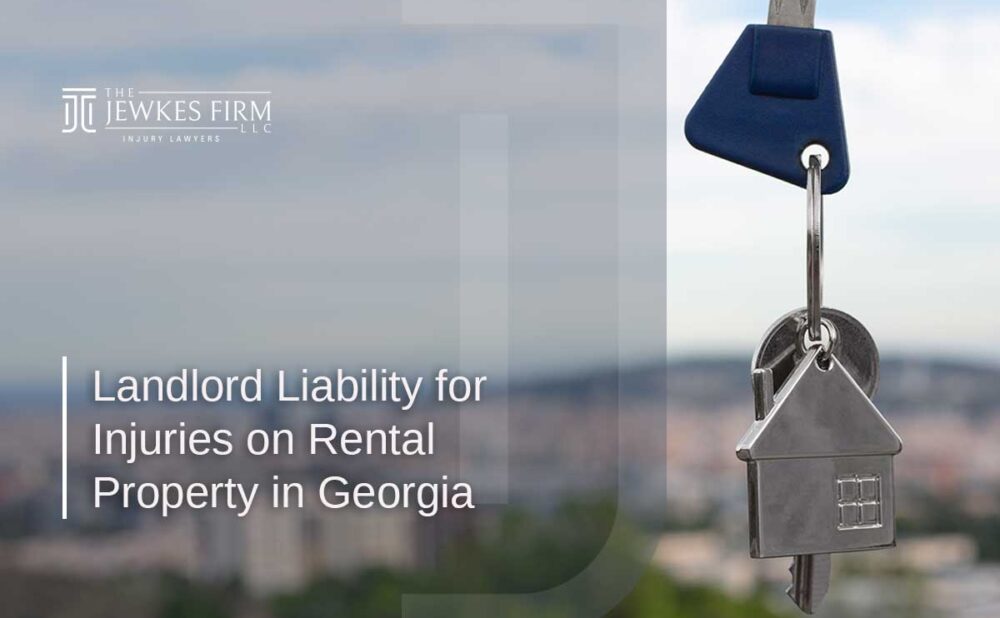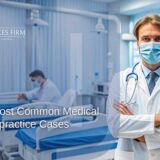Landlord Liability for Injuries on Rental Property in Georgia
Under certain circumstances, a landlord can be held liable for injuries that occur on rental property in Georgia. This liability typically falls under the legal doctrine of premises liability, which holds property owners and occupiers responsible for maintaining safe conditions for lawful visitors.
Understanding landlord liability is crucial when pursuing a personal injury claim. At The Jewkes Firm, Attorney Jordan Jewkes helps injured tenants and visitors navigate these complex legal issues to secure the compensation they deserve.
Understanding Landlord Liability in Georgia
In Georgia, landlords have a legal obligation to ensure their rental properties are safe and free from hazards that could cause injury. Various statutes and legal precedents codify this responsibility.
Georgia Code § 44-7-13: Duty to Maintain Premises
According to O.C.G.A. § 44-7-13, landlords must maintain the premises in a state of repair and are liable for injuries resulting from their failure to do so. This includes ensuring that the property is safe for tenants and their guests.
Georgia Code § 44-7-14: Liability for Defective Construction
O.C.G.A. § 44-7-14 holds landlords responsible for damages arising from defective construction or failure to keep the premises in repair. This statute emphasizes the landlord’s duty to address known hazards promptly.
The extent of a landlord’s liability for injuries depends on several factors, including the nature of the injury, the cause, and the relationship between the injured party and the landlord.
Georgia’s Premises Liability Laws
Georgia follows the general principles of premises liability, which require property owners, including landlords, to exercise reasonable care to prevent foreseeable harm. The key elements to prove landlord liability typically include:
- Duty of Care. The landlord has an obligation to maintain the property in a safe state.
- Breach of Duty. The landlord failed to uphold this duty by allowing hazardous conditions to exist.
- Causation. The landlord’s breach directly caused the injury.
- Damages. The injured party suffered actual damages, such as medical expenses or lost income.
These principles are outlined in O.C.G.A. § 51-3-1, which governs premises liability in Georgia.
Injured at a Rental Property? Contact Us For A Free Consultation
Injured at a Rental Property?
Common Situations Leading to Landlord Liability
A landlord may be held liable for injuries on rental property if the injury results from the landlord’s negligence or failure to fulfill their duty to maintain safe premises. Common scenarios include:
- Unsafe Conditions. If the landlord knew or should have known about dangerous conditions—such as broken stairs, faulty wiring, or slippery floors—and failed to repair them, they may be liable. Allowing dangerous conditions such as mold, leaks, or uneven flooring to persist is grounds for liability as well.
- Failure to Repair. Landlords must address repair requests promptly. Ignoring or delaying repairs that create hazardous conditions—like broken stairs or faulty wiring—can lead to liability.
- Common Areas. Landlords are responsible for maintaining common areas like hallways, stairwells, parking lots, and laundry rooms. Injuries caused by unsafe conditions in these areas may result in landlord liability.
- Inadequate Security. Landlords not providing sufficient lighting or security measures, and an injury occurs due to criminal acts on the property.
In such cases, tenants or visitors may have grounds to file a premises liability lawsuit against the landlord.
When Is a Landlord Typically Not Liable?
There are situations where a landlord may not be held responsible for injuries such as:
- Tenant’s Own Negligence. If the tenant or visitor caused their own injury through reckless behavior, the landlord may not be liable.
- Unknown Hazards. If the landlord had no knowledge and no reasonable way to know about a dangerous condition, liability may not apply.
- Tenant-Caused Damage. Injuries resulting from hazards created by the tenant or other occupants may not be the landlord’s responsibility.
Who Can File a Claim?
Individuals who may file a premises liability claim against a landlord include:
- Tenants. Those who lease or rent the property.
- Guests of Tenants. Visitors invited onto the property by tenants.
- Contractors or Maintenance Workers. Individuals performing work on the property.
- Others on the Property. Any lawful visitors who suffer injury due to the landlord’s negligence.
It’s important to note that the injured party must demonstrate that the landlord had knowledge of the hazardous condition or should have reasonably known about it.
What Should You Do If Injured on a Rental Prosperty?
If you get hurt on a rental property in Georgia, it’s important to take the following steps:
- Seek Medical Attention. Your health is the top priority.
- Document the Scene. Photograph the hazardous condition and your injuries.
- Report the Injury. Notify the landlord or property manager in writing.
- Preserve Evidence. Keep records of communications, repair requests, and witness information.
- Consult an Experienced Attorney. An attorney like Jordan Jewkes can evaluate your case, gather evidence, and advocate for your rights.
Statute of Limitations
In Georgia, the statute of limitations for filing a personal injury claim, including premises liability cases, is two years from the date of the injury. Failing to file within this timeframe typically results in the loss of the right to pursue compensation.

GEORGIA PERSONAL INJURY LAWYER NEAR ME
How The Jewkes Firm Can Help
Landlords in Georgia have a legal duty to maintain their rental properties in a safe condition. When they fail to do so, and an injury occurs as a result, they can be held liable under premises liability law.
If you or a loved one has been injured on a rental property in Georgia, The Jewkes Law Firm is here to help. Attorney Jordan Jewkes has extensive experience handling personal injury cases involving landlord liability in Georgia. We understand the challenges injured tenants face, and we hold negligent landlords accountable. Our team will thoroughly investigate your case, negotiate with insurance companies, and fight to maximize your compensation for medical expenses, pain and suffering, lost income, and more. Contact us today at (770) 771-5130 to schedule your consultation and take the first step toward securing the compensation you deserve.
Frequently Asked Questions
When is a landlord liable for injuries on rental property in Georgia?
A landlord may be liable if they knew or should have known about a dangerous condition and failed to repair it or warn tenants, leading to injury. Under Georgia’s premises liability law, landlords must fix hazardous conditions that could cause harm to tenants or visitors.
What types of injuries could make a landlord liable in Georgia?
Landlord liability may apply to injuries caused by unsafe conditions such as broken stairs, faulty wiring, mold, or inadequate security. If the landlord was aware of or should have known about the hazard and didn’t fix it, they could be held responsible.
Are landlords responsible for injuries in common areas?
Yes, landlords are generally responsible for maintaining safe common areas such as hallways, stairwells, and parking lots.
Can a landlord be held liable for criminal acts on the property?
In some cases, landlords may be liable if they fail to provide adequate security and an injury results from a foreseeable criminal act.
Can tenants sue their landlord for unsafe conditions?
Yes, tenants can sue landlords for injuries caused by unsafe conditions in the rental property. If the landlord was negligent in addressing known hazards, tenants may recover compensation for medical bills, pain, and suffering, among other damages.
How can I prove a landlord’s negligence in Georgia?
To prove a landlord’s negligence, you must show that the landlord was aware (or should have been aware) of the unsafe condition, failed to repair it, and that the failure caused your injury. It’s best to consult with a personal injury attorney to gather the necessary evidence.




